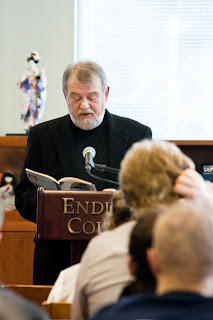
Fathers
A Literary Anthology
Edited by Andre Gerard
Patremoir Press 2011
ISBN 978-09865554-0-4
Depending on the writer, this book is a father's dream, being
the center of attention, his children's remembrance, as in
Annie Dillard's excerpt from, "An American Childhood."
We hear the soft foehn, the breeze of being a daughter:
"…He walked lightly, long-legged, like a soft-shoe hoofer
barely in touch with the floor. When he played the drums, he
played lightly, coming down soft with the steel brushes that
sounded like a Slinky falling, not making the beat but just
sizzling along with it. He wandered into the sun porch,
unseeing; he was snapping his fingers lightly, too, as if
he were feeling between them a fine layer of Mississippi silt.
The big buckeyes outside the glass sunporch walls were
waving…"
The book came from the editor, Andre Gerard's awareness,
the need for an anthology which would speak to children, young
adults, or anyone, or anyone who came to America, often without
their fathers. Gerard taught young people in such situations and these
situations often would cause anger and sadness in his students. Gerard
read father poems to comfort and help them to relate, help them understand
they were not alone:
"…Your father was a dutiful, honest,
Faithful, and useful person."
For such plain praise what fame is recompense?
"A horn-painter, he painted delicately on horn,
He used to sit around the table and paint pictures."
The peace of God needs nothing to adorn
It, nor glory nor ambition.
"He is twenty-eight years buried," she writes, "he was called home
And is, I am sure, doing greater work."
The strength of one frail hand in a dim room
Somewhere in Brooklyn, patient and assured,
Restores my sacred duty to the Word…" Derek Walcott
An introduction to each poem and essay, makes them personal,
an experience, Gerard studies to find the poem's meanings. The book
took many years to compile and he often met with some of the writers,
such as, Rita Dove and Diana Der-Hovanessian.
Some of the work relates to the oppressive nature of a particular father.
The influence of any particular poem or writing can be felt as the reader
hears his large footnotes step down in open verse, as in the famous poem
by Sylvia Plath:
"…Daddy, I have had to kill you.
You died before I had time-
Marble-heavy, a bag full of God,
Ghastly statue with one gray toe
Big as a Frisco seal…"
Every poem, essay, represented in the book is gender balanced
and sensitive to a gender balance. "Nothing can be said about fathers
without first saying a word about mothers. Fathers and mothers are
inextricably, intimately linked" Gerard points out in the introduction to
'Fathers' which inspires and continues the tradition of either blaming
or elevating our parents to a godly, priestly, evil status. The reader will
find what is needed to substantiate their relationship with their father
with poems and excerpts from books we will trudge along pulling our
parents out of their graves. Sometimes the scent is rotten, sometimes
wisteria wafts through out the rooms filling us with recognitions:
"In the steamer is the trout
seasoned with slivers of ginger,
two sprigs of green onion, and sesame oil.
We shall eat it with rice for lunch,
brothers, sister, my mother who will
taste the sweetest meat of the head,
holding it between her fingers
deftly, the way my father did
weeks ago. Then he lay down
to sleep like a snow-covered road
winding through pines older than him,
without any travelers, and lonely for no one" -Li-Young Lee
I recommend this book. It will be read many times and then passed on
to the next generation of readers as a reference book as well as
a direction to further one's knowledge:
"On the morning on May 13, 1998, my father woke up, had breakfast,
got dressed and walked away from the Steinbach Bethesda Hospital,
where he had been a patient for two and a half weeks. He walked
through his beloved hometown, along Hespeler Road, past the old
farmhouse where his mother had lived with her second husband, past
the water tower, greeting folks in his loud, friendly voice, wishing
them well. He passed the site on First Street where the house in
which my sister and I grew up once stood. He walked down Main
Street, past the Mennonite church where, throughout his life, he had
received countless certificates for perfect attendance, past Elmdale
School where he had taught grade six for forty years…" Miriam Toews
Irene Koronas
Poetry Editor:
Wilderness House Literary Review
Reviewer:
Ibbetson Street Press
 ( Click on pic to enlarge)
( Click on pic to enlarge)























































